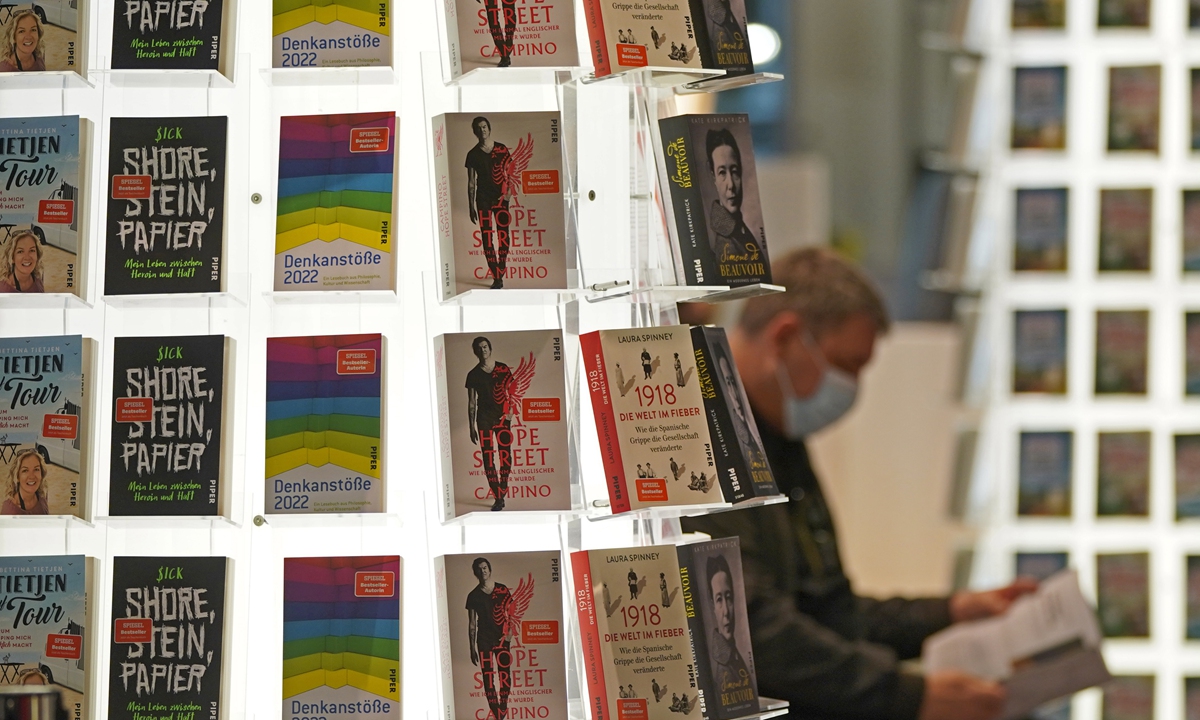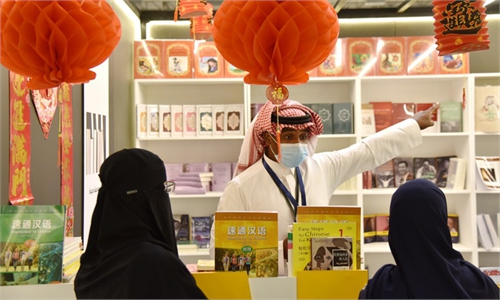ARTS / BOOKS
Chinese publishers send books to Frankfurt Book Fair
Worth the effort

A visitor browses books at the Frankfurt Book Fair in Frankfurt, Germany on Wednesday. Photo: IC
People in the Chinese publishing industry might need to have a second thought when weighing sending their books and staff to Frankfurt Book Fair in 2021 because the downside was palpable.
Surging transportation costs, lengthened and possibly overdue delivery are among the factors that make it an odyssey for Chinese books to travel to Frankfurt. In addition, cross border travel restrictions further complicate the picture at a time when the pandemic is still wreaking havoc.
"We met a lot of hardships in the process of planning and preparations for the exhibition of Chinese books," said Rei Lei, head of the German representative office of the China National Publications Import & Export (Group) Co Ltd, which acted as the organizer for a group of 51 Chinese publishers at the Frankfurt Book Fair.
They managed to bring around 1,500 Chinese books and dozens of events to the book fair, the largest of its kind in the world.
It has been a while since Frankfurt, a European transportation hub that used to be proud of its exhibition economy, hosted an international event on this scale, given that the number of daily new infection cases are still hovering around 20,000 in Germany.
"The desire for in-person interactions is once again bringing the international book and publishing industry together in Frankfurt. The 73rd Frankfurter Buchmesse puts the focus on an industry that has shown itself to be resilient, creative and innovative during the pandemic," said Juergen Boos, president of Frankfurter Buchmesse, at the press conference opening the book fair on Tuesday.
"'Back to business,' however, does not mean things are now 'back to normal': The book fair will look different this year from what we've known in the past," he said.
The annual event was forced to go online in 2020 at the height of the pandemic. With a heightened priority on safety of participants, the organizer limited the number of visitors for the five-day fair that kicked off on Wednesday.
Visitors find the fair much less crowded: The number of exhibitors has come down to around 2,000 from 7,400 in 2019. Exhibitors have to cope with downsized booths. The 51 Chinese publishers share a 56-square-meter booth.
Meanwhile, the outpouring of enthusiasm for Chinese books at the Frankfurt Book Fair makes the ordeal of Chinese publishers worthwhile.
"It is very cool to have the Chinese books at the fair," Sarah Skalischus, a university graduate, said.
Skalischus has never been to China but is no stranger to the Chinese language. With a keen interest in Chinese language and culture, she hopes to get to learn more about China by reading Chinese books.
"Some my friends' children are learning Chinese and I hope to get some exquisite Chinese books for them as a gift," she said.
As a sinologist and chief of a German publishing company named Drachenhaus Verlag, Nora Frisch believes the hostile stories run by Western media about China hamper people from getting to understand China.
"We have to stay in contact and we need the dialogue," she said and added that the need to communicate with and talk to China was the reason behind her decision to set up a publishing company.
Frisch has published several works of Chinese children's author Cao Wenxuan in the past few years. Ostensibly it seems difficult for German readers to understand Chinese literature, but it turns out that "once they start reading, they cannot stop," she said.
A German girl wrote in her blog that she finished reading a book by Cao overnight, Frisch said, adding that she plans to translate and publish more Chinese books in the future.



